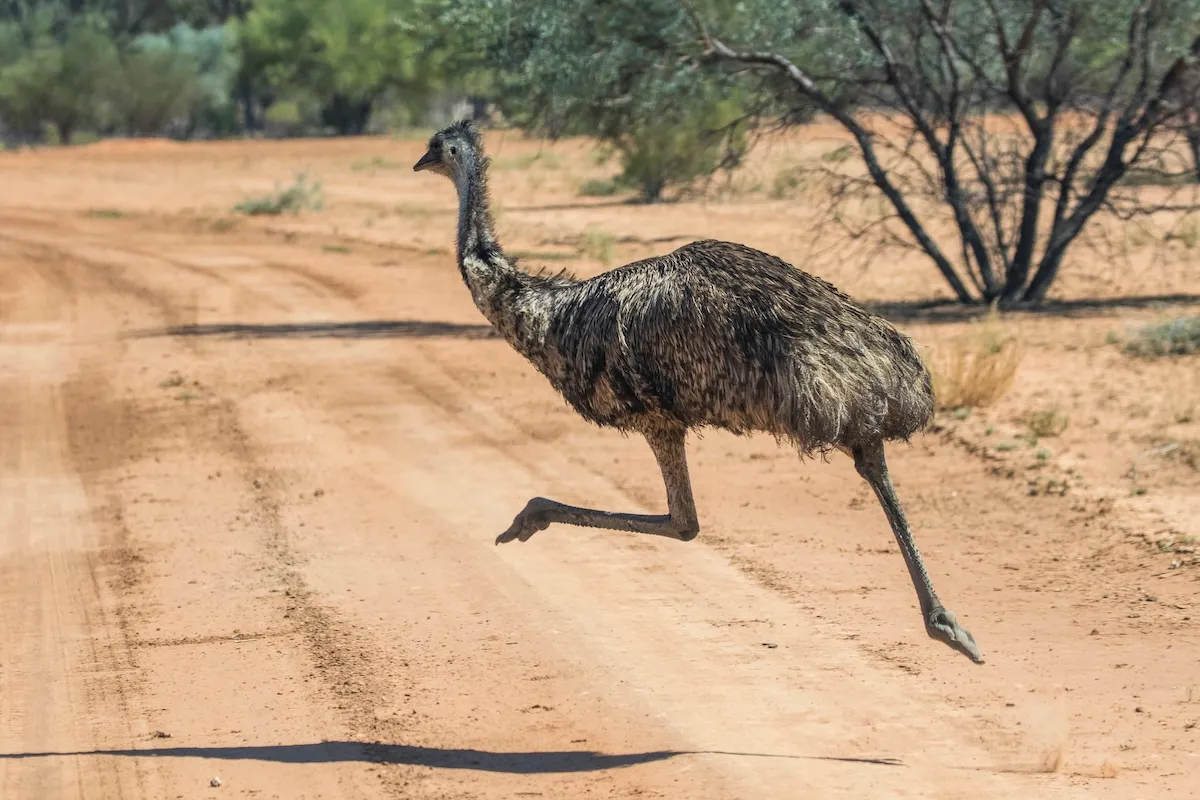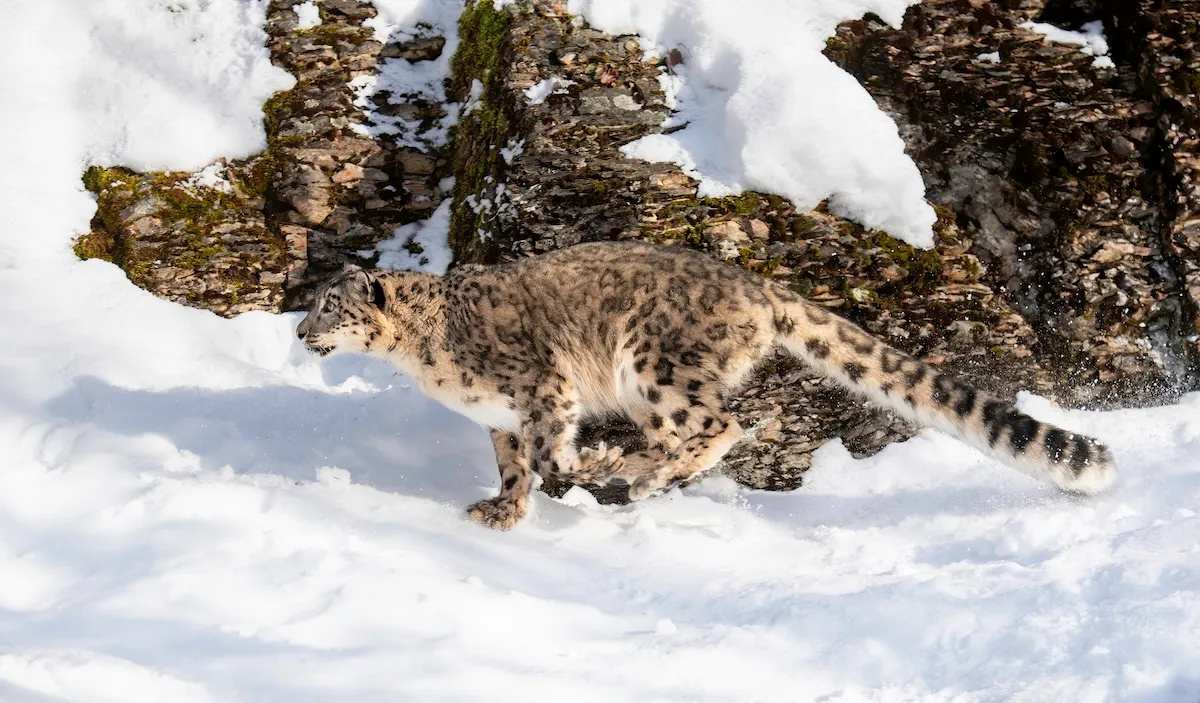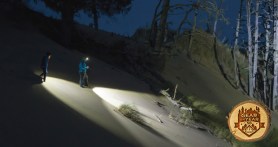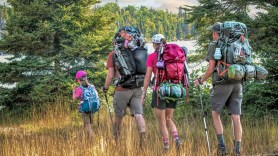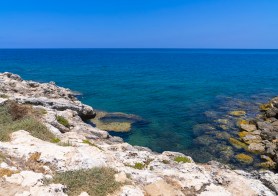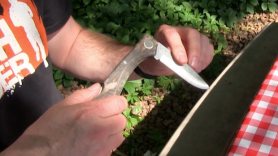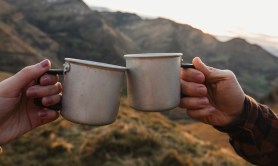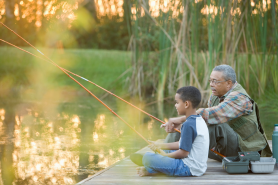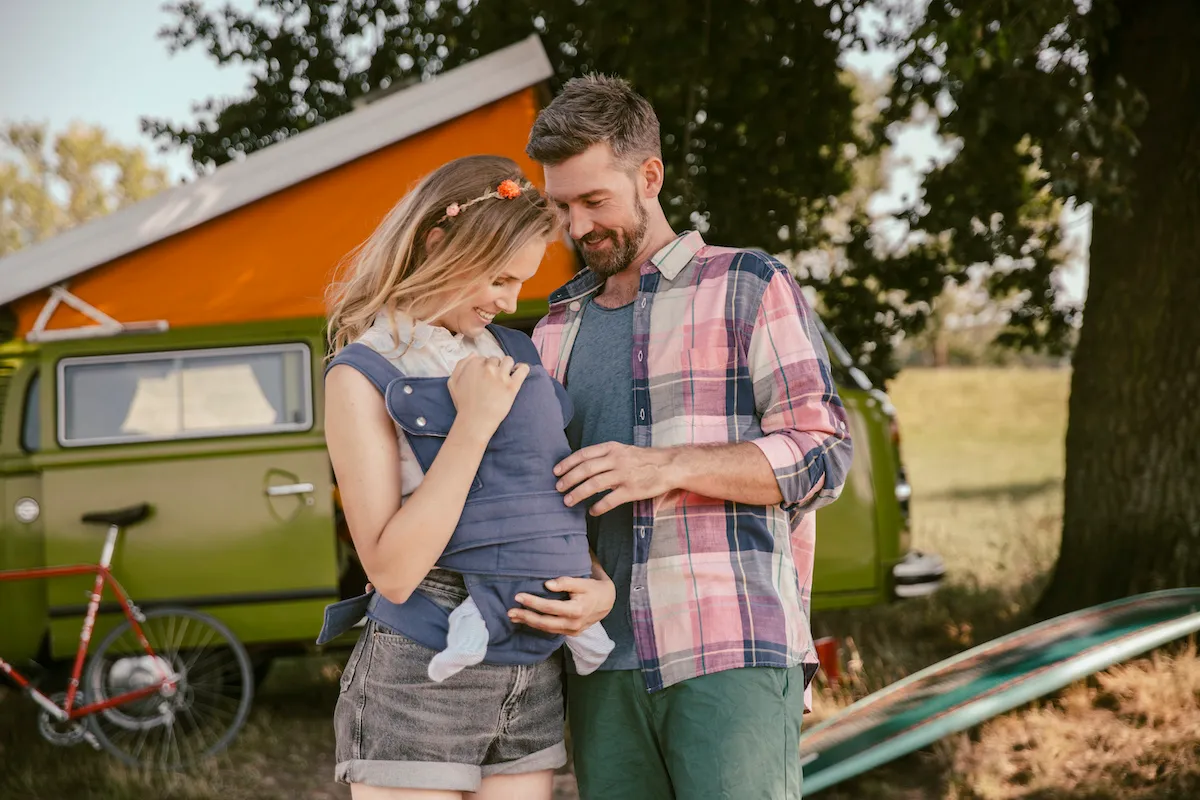

You had a baby, but you don’t want to give up your adventurous lifestyle—who else can relate?
Videos by Outdoors
Becoming a parent rocks your world; your priorities change almost overnight and your free time dwindles to a fraction of what it once was. Now that you’ve brought this squishy bundle of joy into the world, though, you want to start enjoying life with your new family as soon as possible.
Well, here’s your sign. Camping with a baby is within reach, especially if you’re willing to be flexible. Babies and toddlers benefit from spending time outdoors, and the family bonding time will be worth the extra effort.
From one camping parent to another, here are some things to keep in mind when prepping for a camping adventure with an infant, plus some tips for camping with a baby to help ensure it’s safe and fun for all.
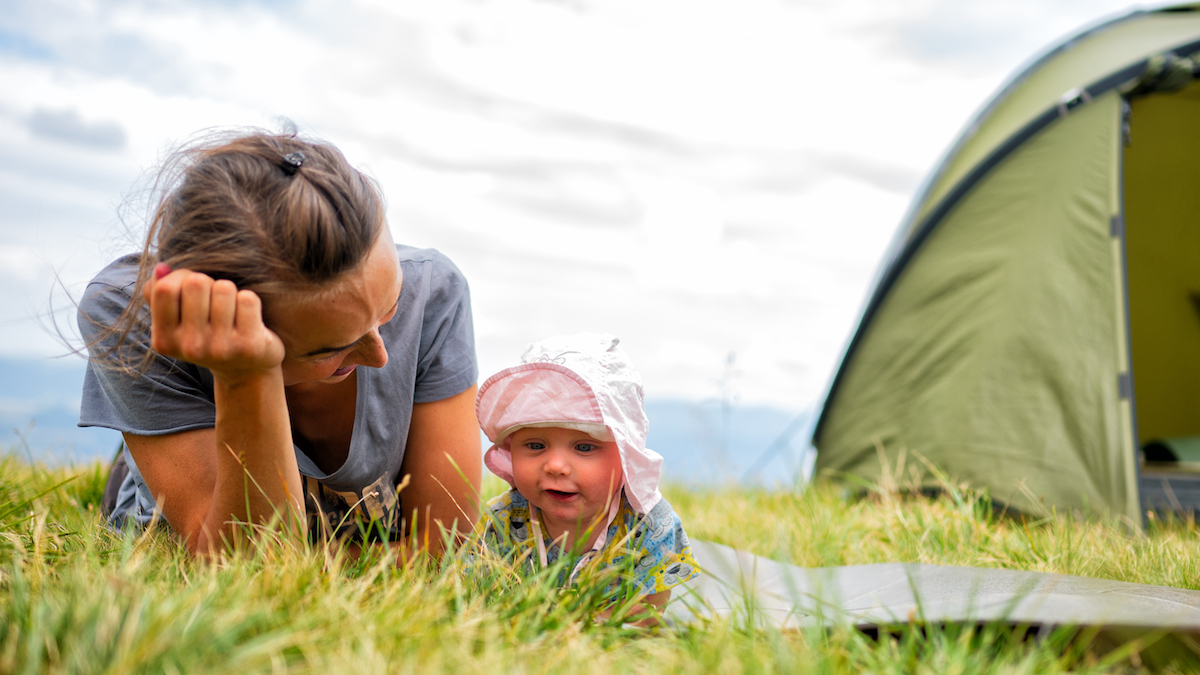
This post contains affiliate links. Outdoors.com may earn a commission when you make a purchase through these links. Thank you for your support.
How Do You Camp With a Baby?
Moving from camping as a couple to camping as a family can feel intimidating. It’s easy to get caught up in the waiting game—waiting until you feel more in control of life post-baby, waiting until your baby is older, or waiting until you can splurge on some new gear.
Be warned, though, if you start playing the waiting game, you may end up waiting for a long time. Camping with a toddler is not easier than camping with a baby, so maybe it’s best to just rip off the Band-Aid and get started now.
To camp with a baby, you need to manage your expectations, be willing to be flexible, and bring some baby-specific gear. If you can do all of this, your baby’s first camping trip will be a memorable one—maybe not for your baby, but certainly for you.
Once you have a successful family camping trip under your belt, you’ll feel so much more confident for future trips. You’ll find a groove that’ll help you maximize the fun. Before you know it, your baby will be a camping pro, and you’ll be sharing your wisdom with other parents who want to go on their first camping trip after a new baby.
At What Age Can You Take a Baby Camping?
The age at which you start camping with a baby is up to you. In those sleepy first few months, camping with a newborn can be pretty straightforward, if your baby will sleep in whatever you bring for her to sleep in (that’s a big if).
At five weeks old, I wore my son around in a wrap-style baby carrier on his first camping trip. He “slept” in a pack ‘n play (for a couple hours at a time, at least), and he hung out in a Dock-a-Tot baby lounger when he was content to not be held.
After those first few months—the so-called “fourth trimester”—your baby will be much more alert and interested in what’s going on around him. This is a fun time full of milestones, and it can be a great time to experience milestones outdoors. If you get hit hard with a sleep regression, though, give yourself some grace and just wait it out.
Camping with a mobile baby who can crawl or walk is a whole different ballgame . . . and also a new level of fun. Up your safety game around the campsite as soon as your baby becomes mobile.
No matter the age you decide to start, take extra care to keep your baby at a comfortable temperature and ensure you have a safe sleep setup. The camping gear you need to bring will change depending on your baby’s age and level of development.
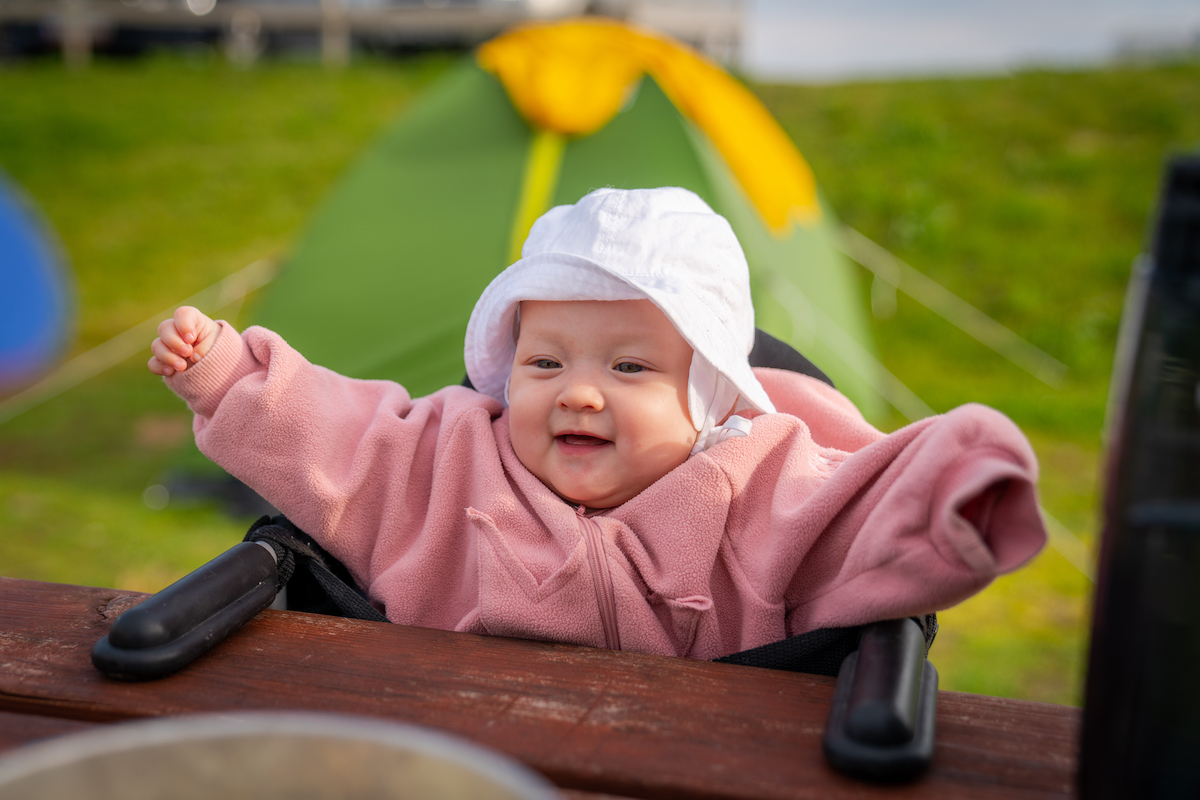
10 Helpful Tips for Camping With a Baby
1. Start Small and Close to Home
For your first trip out, especially if you have babies younger than a year old, consider starting small and sticking relatively close to home.
Plan on not getting a good night’s sleep on your first couple of camping trips with a baby. That way, if you do, you’ll be pleasantly surprised, but if you don’t, you won’t feel overly frustrated.
Find a location that’s within an hour or two from home and stay for just a couple of nights, preferably during milder times of the year. Try to find an established campground, unless you’re already an experienced camper. That way, you have some basic amenities available to you, like garbage cans for dirty diapers, potable drinking water, and toilets.
Car camping is a good choice when camping with a baby (car camping is camping within walking distance from your car), because it gives you space to store your extra baby gear.
Maybe save that backpacking trip for a few years down the road, when you can pack light and the kids can carry some of their own stuff.
2. Plan for a Safe Sleeping Environment
Where do babies sleep when camping? If you’re cabin camping, RV camping, or tent camping with a big enough tent, you can set up a pack ‘n play or travel crib. Choose something that’s lightweight and fits within your tent or camper. (Pop your tent up in the backyard and measure it all out before you buy.)
If you have a small tent, consider a travel bassinet or portable sleeping pod instead. Both options—a sleeping pod or a portable crib—will keep your baby sleeping in her own separate space while still within arm’s reach.
To keep your baby warm at night, consider a wearable sleeping bag if your baby is over six months old or a swaddle if your baby is younger than six months. If you’re still in the swaddling phase and it’s cold outside, choose a swaddle made for cold weather or a winter sleep sack and layer it over warm footie pajamas.
Note that hats are not recommended for sleeping babies under a certain age. Do your own safe-sleep research before you head out to make sure you have what you need to keep your baby safe and comfortable all night long.
3. Bring a Portable Sound Machine
If you use white noise at home, invest in a battery-powered portable sound machine to bring on your camping trip.
I found that white noise helped my babies fall asleep and stay asleep during naps, even when there was a lot going on around them.
Use this handy little device for bedtime and nap time, as needed.
4. Buy a Rocking Camp Chair
If you’re taking a baby camping, get yourself a foldable rocking chair and thank me later. As a nursing, camping mom, my GCI rocking chair made it so much easier to enjoy camping. When my eldest was a baby, we’d bring this camp chair on all road trips, and I’d set it up inside hotel rooms and relatives’ houses to ensure I had a rocking chair on the go.
Obviously, the GCI rocker also comes camping with us, and it has helped me put my kids down for many, many naps.
Here’s a list of our recommendations for best camping rocking chairs and the best reclining camp chairs.
5. Upgrade Your Gear for Baby
You will need to refresh your camping gear post-baby, and that may include upgrading your good ‘ole two-person tent to include a bigger family-size tent for some extra room. (Check out our recommendations for best camping tents.)
Also consider what you’d like your baby to play on or in while outdoors around the campsite. This could be as simple as a nice camping blanket under some shade, or you can bring a pack ‘n play out for a place to keep your baby safe when she’s not being held. Don’t forget to let her play in the dirt, too.
For older babies who are sitting up and eating solids, add a portable high chair to your camping baby gear.
Have something on hand for carrying your baby on hikes or around the campsite. If your baby can’t hold up his head yet, stick to a basic wrap or structured carrier with infant insert. I loved the Baby K’tan wrap for a non-structured wrap carrier and the Ergobaby 360 for a structured carrier.
If your baby is walking but will still need to be carried for parts of a hike, invest in a child-carrier hiking backpack that’ll work for a broad weight range, so you can use it for the next several years. The Deuter Kid Comfort child carrier served my family well on hikes in several national parks and beyond.
6. Go Easy on the Toys
It’s tempting to bring everything your baby owns on a camping trip, but consider going light on the toys. The great outdoors is the best playground, and you’d be surprised how being in a new environment will capture your baby’s attention. (Definitely bring some of your baby’s favorite toys along for long car rides, though.)
This goes for older kids as well. Handing kids a bunch of toys takes away the opportunity for them to be creative with their surroundings, and this creativity is an important part of the camping experience.
7. Protect Your Baby From the Campfire
When you have a campfire and a mobile baby, keep one parent on fire duty at all times. Burns are all too common, so when bringing kids camping, no matter their age, be prepared with a barrier to put around the fire, like a pet exercise gate that’s staked down well.
8. Keep Some Sort of Routine
It can be hard to replicate your baby’s normal bedtime routine on camping trips, but that doesn’t mean you shouldn’t try at all. If a feed, a bath, and some snuggles is what does the trick at home, prepare to do the same while camping to the extent you can.
There’s going to be a lot that’s different, of course, so bringing some familiarity to sleeping times by following a basic routine will help you and your babe wind down for the night.
9. Let Go of Routine Perfection
Routines are life when you have an infant, but outdoor adventuring with your baby will require some flexibility on your part (and on your baby’s part). Naps may happen at inconvenient times, or they might not happen at all, and sleep in general may be hit or miss.
While you should consider ahead of time how you can best recreate your routines for bedtime and nap time at the campsite, know that it won’t be perfect and try to be okay with it.
10. Manage Your Expectations
This last tip is the real key to successfully camping with a baby and with kids in general: Manage your expectations.
Camping with your little one is going to be different than camping before kids. You won’t get to relax as much; it’ll feel like more work. It can also be super fun and rewarding to spend quality family time outside—just don’t expect it to be all fun all the time.
Also, since babies are easily overstimulated, don’t expect your little one to fully appreciate your favorite pastime quite yet. As she gets older, your baby will learn to love the great outdoors as much as you do, especially if you make camping part of your family culture early on.
Camping With a Baby: Packing Checklist
Wondering what to pack before going camping with a baby?
Check out our camping guide for a full list of camping essentials to pack, and also consider these items:
Sleeping and Playing
- Pack ‘n play, travel crib, portable bassinet, or portable sleeping pod
- Wearable blanket, sleep sack, swaddle, or wearable sleeping bag
- Baby lounger for awake times
- Portable sound machine (and extra batteries)
- Camping blanket(s)
- Teethers, books, other baby toys
- Pacifiers and lovies
Eating and Drinking
- Bottles and bottle brush for cleaning
- Sippy cup(s)
- Baby food and snacks
- Portable high chair
- Bibs
- Baby utensils, bowls, and plates
- Jetboil Flash cooking system for warming bottles quickly
- Small soft-sided cooler for transporting breastmilk or purées
Clothing
- Layers of clothing suited for the weather
- Socks
- Beanies
- Windproof outer layer
- Warm footie pajamas
- Burp cloths or receiving blankets for spit up
First Aid and Hygiene
- First-aid kit
- Infant Tylenol and dosing cup or syringe
- Thermometer
- Gentle, biodegradable soap and washcloth
- Baby toothbrush and toothpaste
- Hand sanitizer
- Bug spray, insect-repelling lotion, or insect-repelling wipes (follow use instructions and check recommended age before use)
- Sun protection: UPF-rated clothing and hats and/or sunblock (follow use instructions and check recommended age before use)
- Disinfecting wipes for cleaning items that drop on the ground
Diapering
- Disposable or cloth diapers
- Disposable or cloth wipes
- Changing pad
- Trash bags for dirty diapers
- Diaper cream (if your baby is prone to diaper rash)
Other Gear
- Rocking camp chair
- Baby carrier
- Child-carrier hiking backpack
- Pet exercise gate and extra stakes to surround the campfire
- Kid-sized camping chair(s)
- Wet bag to collect soiled clothes
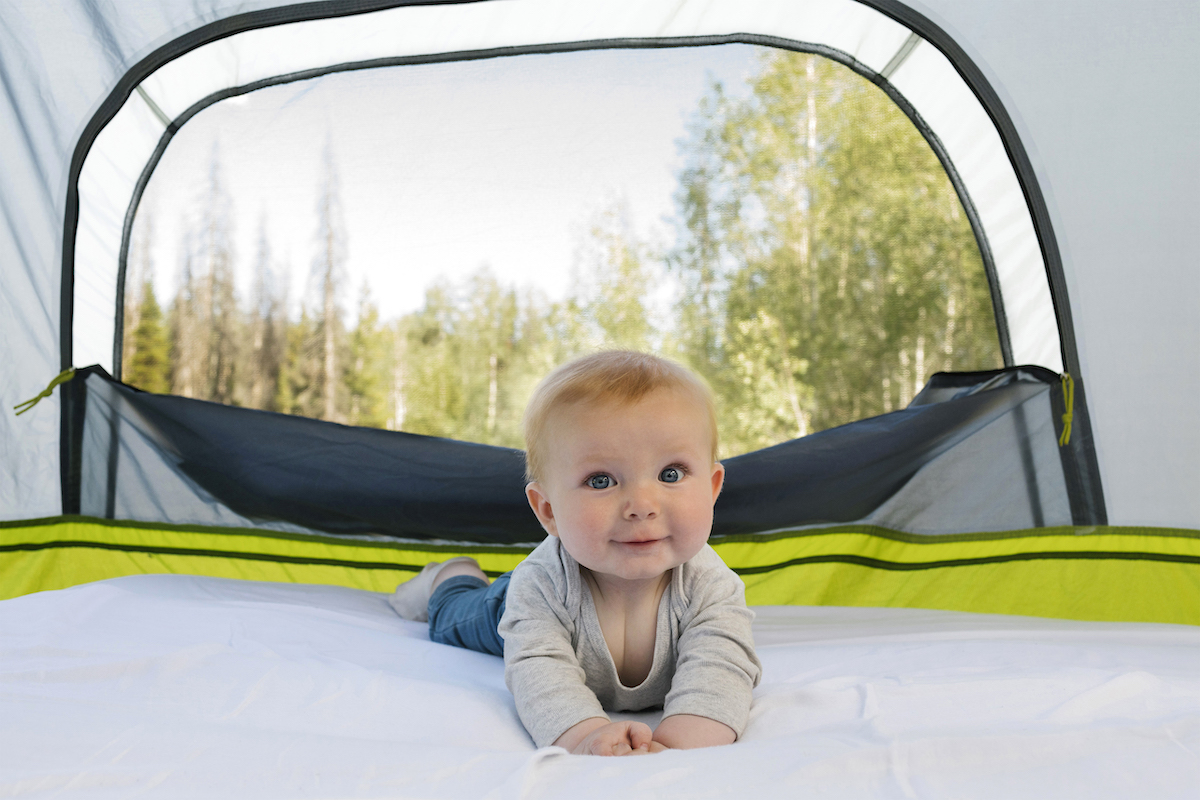
It’s Time for Baby’s First Camping Trip
If you have a baby at home, you may feel a bit nervous about your first time camping with an infant. With some planning and preparation, though, you can have a happy baby and a good time, even if it’s a little bit harder than it was before.
Whether you’re tent camping or camping in an RV, whether your baby is bottle feeding or exclusively breastfed, and whether you co-sleep or sleep side-by-side, each family is going to camp with their infant a little bit differently.
Pack plenty of diapers and extra clothing, embrace the chaos, and let your little one explore. Soon, you’ll be a pro.
